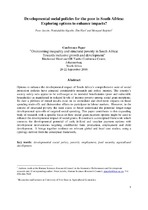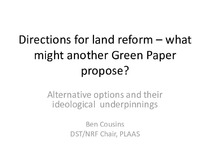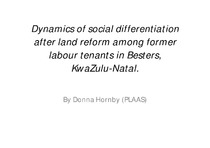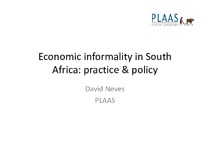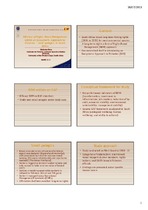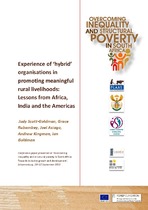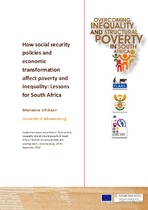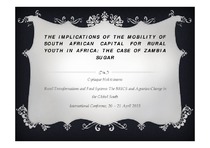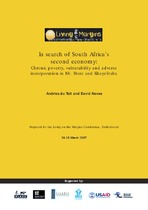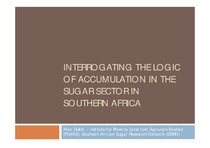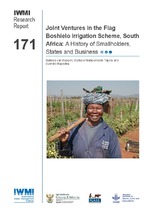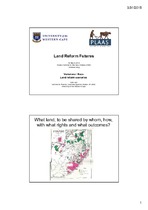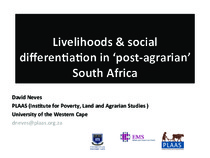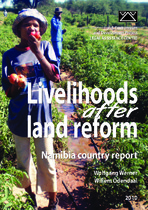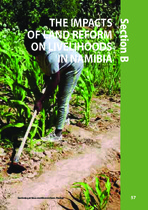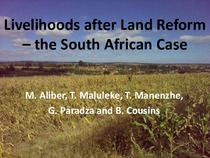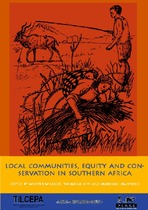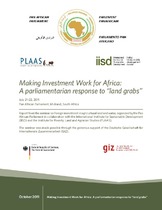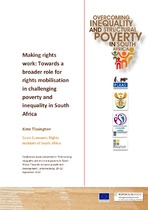Browsing Conference Papers and Reports by Title
Now showing items 17-36 of 71
-
Development of evidence-based policy around small-scale farming
(Institute for Poverty Land and Agrarian Studies (PLAAS), 2015)How to support small-scale and larger commercial farmers, and to make sure that they are productive and contribute effectively to the rural economy and to national food security. -
Developmental social policies for the poor in South Africa: Exploring options to enhance impacts?
(Institute for Poverty Land and Agrarian Studies (PLAAS), 2010)Options to enhance the developmental impact of South Africa’s comprehensive suite of social protection policies have attracted considerable research and policy interest. The country’s society safety nets appear to be ... -
Directions for land reform – what might another Green Paper propose? Alternative options and their ideological underpinnings
(2012)International and SA debates: 4 broad approaches & loose coalitions • “Modernist-conservative”/modernisation: support the existing structure of agriculture (capital intensive farming in large units) but deracialise LSCF ... -
Dynamics of social differentiation after land reform among former labour tenants in Besters, KwaZulu-Natal
(2012)• Locate land reform in SA in changes in 1970s which ended “state activism in capitalism” and started the “moment of ‘globalization” • Global restructuring of capital has been accompanied by the “fragmentation” of classes ... -
Economic informality in South Africa: practice & policy
(2015)SA context: • High poverty & unemployment, yet small SMME sector. • Informal sector: African, low earning, female & retail dominated. • Inhibited by: – Spatial, labour market & ‘human capital’ legacies -
Efficacy of rights based management within an ecosystems approach to fisheries - Small pelagics in South Africa
(2013)• South Africa issued long-term fishing rights (2006 to 2020) for most commercial species Long-term rights a form of Rights Based Management (RBM) approach • Has committed itself to introduce an Ecosystems Approach to ... -
Experience of ‘hybrid organisations in promoting meaningful rural livelihoods: Lessons from Africa, India and the Americas
(2010)A Ford Foundation Rural Livelihoods Learning Group carried out a study into ‘hybrid’ organisations and strategies between July 2008 and September 2009. Twenty –one case studies were completed of hybrid organisations ... -
How social security policies and economic transformation affect poverty and inequality: Lessons for South Africa
(Institute for Poverty Land and Agrarian Studies (PLAAS), 2010)This article examines how various characteristics of social and economic policy frameworks affect poverty and inequality levels in developing countries, principally in Botswana and Mauritius. The research findings suggest ... -
The implications of the mobility of South African capital for rural youth in Africa: The case of Zambian sugar
(2015) Developing young people as independent farmers and producers, capable to establish land-based livelihood at their own and on their own terms, seems to be the most desirable option to ensure the rural futures of rural ... -
In search of South Africa’s second economy: Chronic poverty, vulnerability and adverse incorporation in Mt. Frere and Khayelitsha
(Institute for Poverty Land and Agrarian Studies (PLAAS), 2007)Since 2003, South African policy discourse about persistent poverty has been dominated by the notion that poor people stay poor because they are trapped in a ‘second economy’, disconnected from the mainstream ‘first world ... -
Interrogating the logic of accumulation in the sugar sector in Southern Africa
(2016)Introduction to regional patterns of sugar production accumulation by way of data analysis for key (formerly ‘South African’) firm Illovo across 6 countries ‘Centrifugal’ logic throws-up a diversity of routes of ... -
Joint ventures in the Flag Boshielo Irrigation Scheme, South Africa: a history of smallholders, states and business
(International Water Management Institute (IWMI)., 2018)For over a century, debates about the relation between farm size, mode of farming and land productivity have shaped agrarian policies, programs and research across the world. Until the 2000s, the pendulum tended to swing ... -
Land reform futures
(2015)Overarching story • Away from pro-poor neo-liberalism towards the convergence of state resources, private capital and traditional authority • Elite capture of shrinking state resources – dangerous combination in context ... -
Livelihoods & social differentiation in ‘post-agrarian’ South Africa
(2017)• Legacy: Settler colonialism & migrant labour • Industrialization & proletarianisation • Dichotomous agrarian landscape • Rural poverty, esp. former homelands • Longstanding deagrarianisation -
Livelihoods after land reform: Namibia country report (2010)
(Land, Environment and Development Project, Legal Assistance Centre, 2010) -
Livelihoods after land reform: Namibia country report (2010) Section B
(Land, Environment and Development Project, Legal Assistance Centre, 2010)The first AALS farmers in Hardap obtained their land in 1992, and the most recent in 2003. In Omaheke, the first AALS farmer obtained his farm in 1992 and the most recent, a woman, in 2000. Thus in both regions the oldest ... -
Livelihoods after land reform: The South African case
(Institute for Poverty Land and Agrarian Studies (PLAAS), 2012)SA’s land reform regarded as a failure – economic objectives – the spectre of ‘failed projects’ – changing the racial pattern of land ownership – too slow • No consensus as to why, or what to do • Even so, ambitious ... -
Local communities, equity and conservation in southern Africa: A synthesis of lessons learnt and recommendations from a southern African technical workshop
(Institute for Poverty Land and Agrarian Studies (PLAAS), 2003)This publication reports on a technical workshop entitled ëCommunities and Conservation in Southern Africa: Key Issues and Challenges towards a more Equitable and Sustainable Futureí, which was held on 26ñ28 February 2003 ... -
Making investment work for Africa: A parliamentarian response to “land grabs”
(Institute for Poverty Land and Agrarian Studies (PLAAS), 2011)A new wave of foreign investment in Africa’s farmland and water was triggered in 2008 by the growing demand in Europe and North America for biofuels, spikes in oil prices, the global food crisis and the world financial ... -
Making rights work: Towards broader role for rights mobilisation in challenging poverty and inequality in South Afric
(Institute for Poverty Land and Agrarian Studies (PLAAS), 2010)This paper contemplates a broader conceptualisation/role for socio-economic rights use and mobilisation in South Africa, which not only mitigates the effects of poverty and inequality but also undertakes to address the ...


